Ethics Case Study: Chinese Students’ Interpretation of Trust
VerifiedAdded on 2023/06/05
|8
|1556
|79
AI Summary
This case study investigates the interpretation of trust by Chinese students. It includes a participant information sheet and consent form, and discusses the researcher's approach to answering questions and treating deviant answers. The study is voluntary and participants can withdraw at any time. The researcher should treat all answers equally to give a valid representation of Chinese students' understanding of trust.
Contribute Materials
Your contribution can guide someone’s learning journey. Share your
documents today.
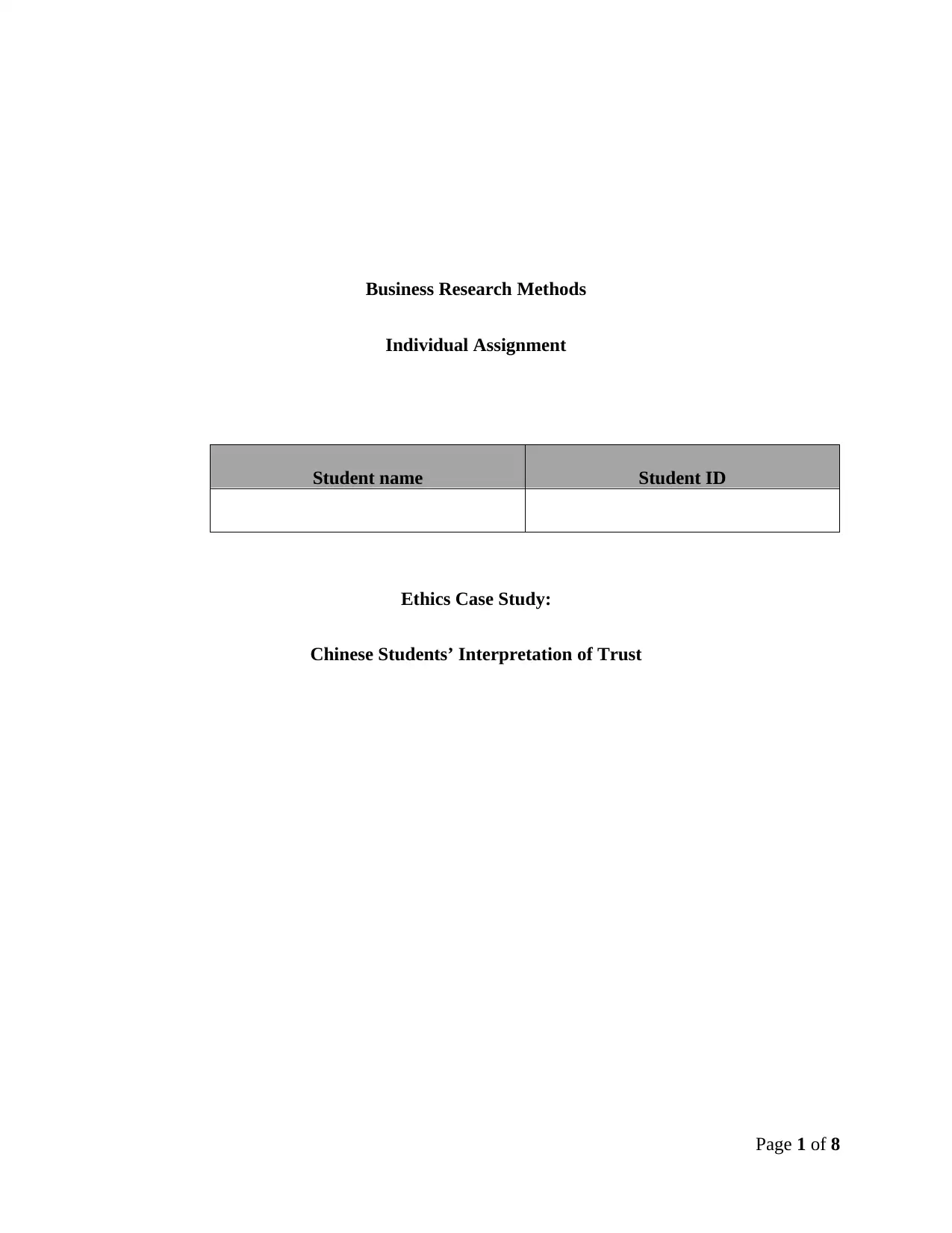
Business Research Methods
Individual Assignment
Student name Student ID
Ethics Case Study:
Chinese Students’ Interpretation of Trust
Page 1 of 8
Individual Assignment
Student name Student ID
Ethics Case Study:
Chinese Students’ Interpretation of Trust
Page 1 of 8
Secure Best Marks with AI Grader
Need help grading? Try our AI Grader for instant feedback on your assignments.
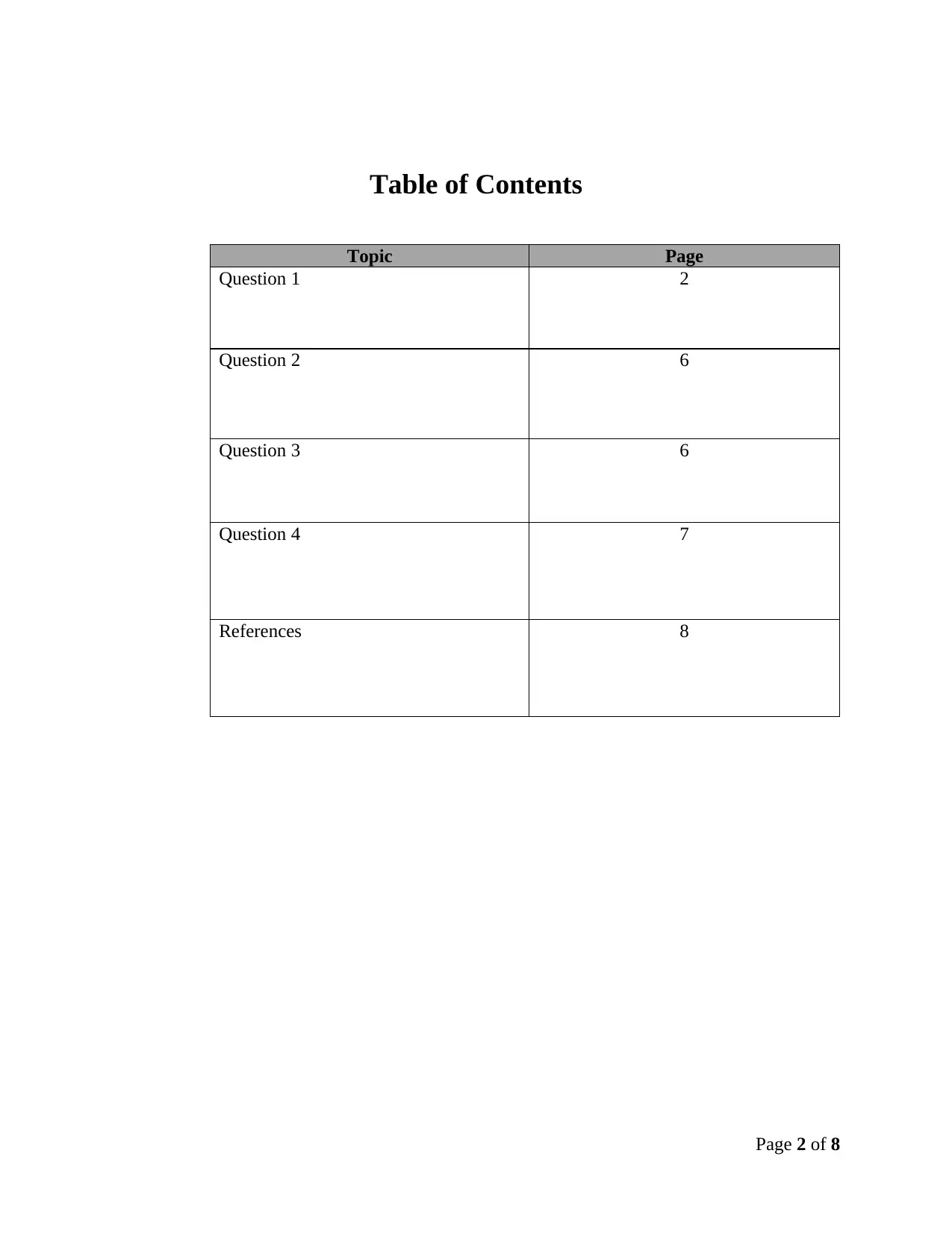
Table of Contents
Topic Page
Question 1 2
Question 2 6
Question 3 6
Question 4 7
References 8
Page 2 of 8
Topic Page
Question 1 2
Question 2 6
Question 3 6
Question 4 7
References 8
Page 2 of 8
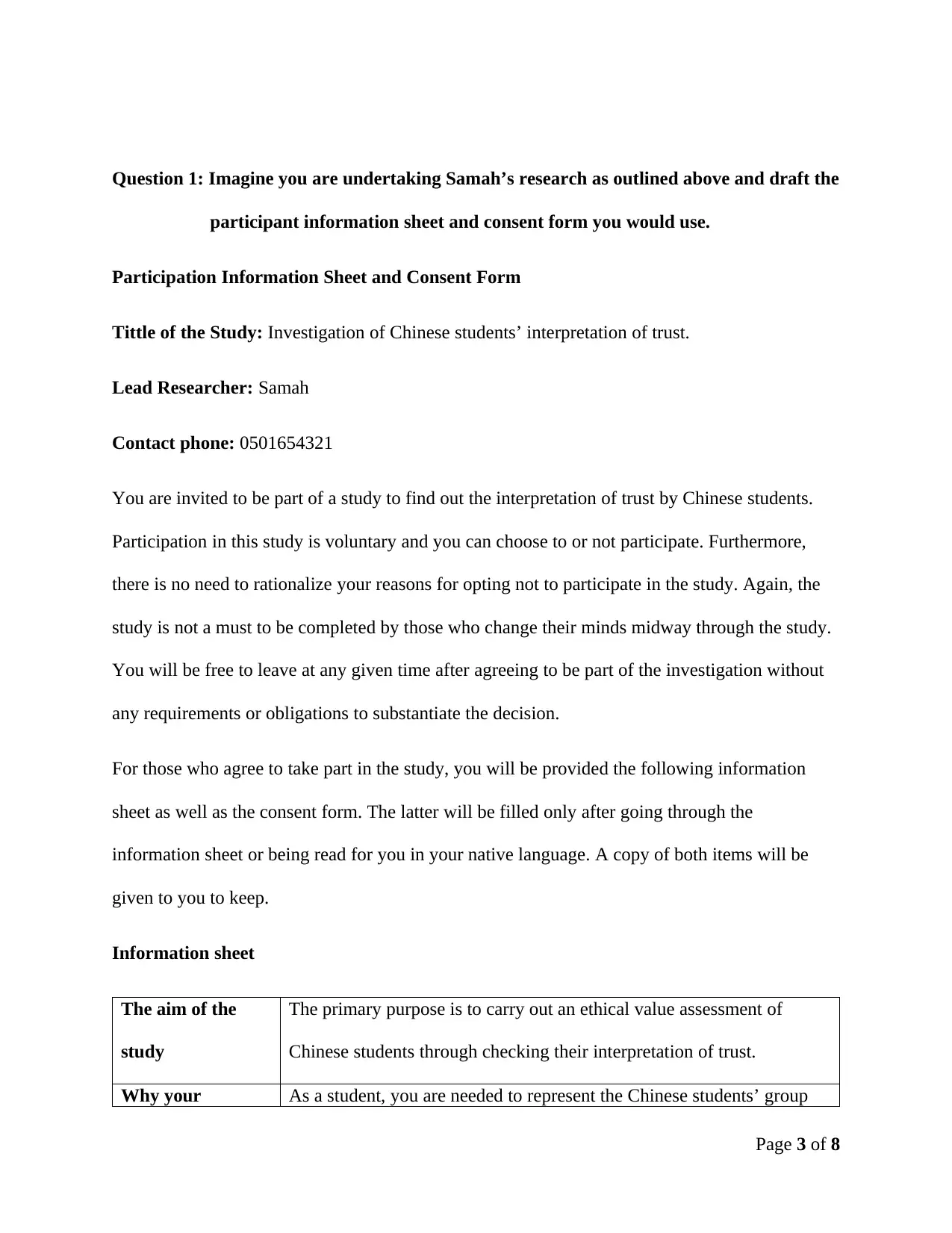
Question 1: Imagine you are undertaking Samah’s research as outlined above and draft the
participant information sheet and consent form you would use.
Participation Information Sheet and Consent Form
Tittle of the Study: Investigation of Chinese students’ interpretation of trust.
Lead Researcher: Samah
Contact phone: 0501654321
You are invited to be part of a study to find out the interpretation of trust by Chinese students.
Participation in this study is voluntary and you can choose to or not participate. Furthermore,
there is no need to rationalize your reasons for opting not to participate in the study. Again, the
study is not a must to be completed by those who change their minds midway through the study.
You will be free to leave at any given time after agreeing to be part of the investigation without
any requirements or obligations to substantiate the decision.
For those who agree to take part in the study, you will be provided the following information
sheet as well as the consent form. The latter will be filled only after going through the
information sheet or being read for you in your native language. A copy of both items will be
given to you to keep.
Information sheet
The aim of the
study
The primary purpose is to carry out an ethical value assessment of
Chinese students through checking their interpretation of trust.
Why your As a student, you are needed to represent the Chinese students’ group
Page 3 of 8
participant information sheet and consent form you would use.
Participation Information Sheet and Consent Form
Tittle of the Study: Investigation of Chinese students’ interpretation of trust.
Lead Researcher: Samah
Contact phone: 0501654321
You are invited to be part of a study to find out the interpretation of trust by Chinese students.
Participation in this study is voluntary and you can choose to or not participate. Furthermore,
there is no need to rationalize your reasons for opting not to participate in the study. Again, the
study is not a must to be completed by those who change their minds midway through the study.
You will be free to leave at any given time after agreeing to be part of the investigation without
any requirements or obligations to substantiate the decision.
For those who agree to take part in the study, you will be provided the following information
sheet as well as the consent form. The latter will be filled only after going through the
information sheet or being read for you in your native language. A copy of both items will be
given to you to keep.
Information sheet
The aim of the
study
The primary purpose is to carry out an ethical value assessment of
Chinese students through checking their interpretation of trust.
Why your As a student, you are needed to represent the Chinese students’ group
Page 3 of 8
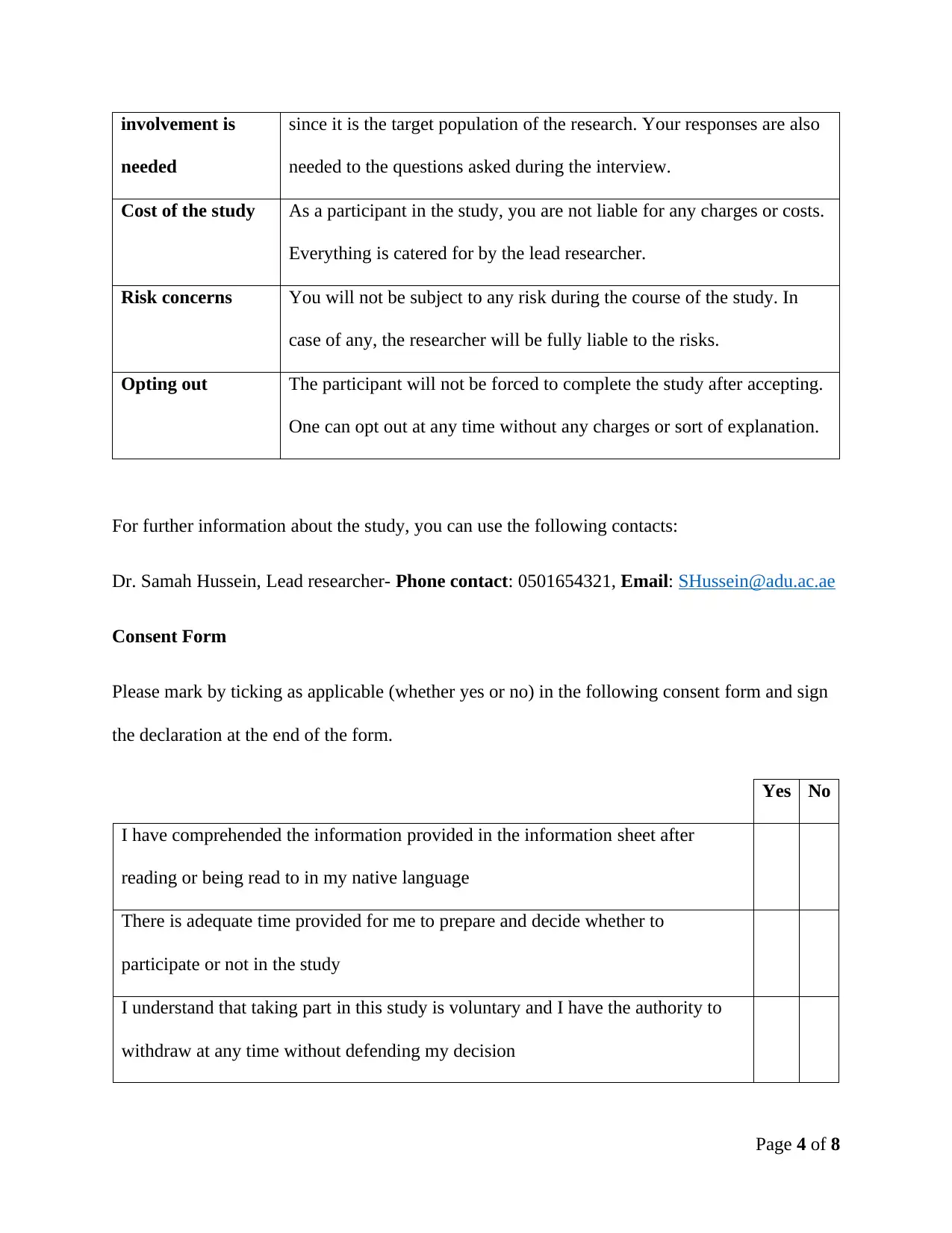
involvement is
needed
since it is the target population of the research. Your responses are also
needed to the questions asked during the interview.
Cost of the study As a participant in the study, you are not liable for any charges or costs.
Everything is catered for by the lead researcher.
Risk concerns You will not be subject to any risk during the course of the study. In
case of any, the researcher will be fully liable to the risks.
Opting out The participant will not be forced to complete the study after accepting.
One can opt out at any time without any charges or sort of explanation.
For further information about the study, you can use the following contacts:
Dr. Samah Hussein, Lead researcher- Phone contact: 0501654321, Email: SHussein@adu.ac.ae
Consent Form
Please mark by ticking as applicable (whether yes or no) in the following consent form and sign
the declaration at the end of the form.
Yes No
I have comprehended the information provided in the information sheet after
reading or being read to in my native language
There is adequate time provided for me to prepare and decide whether to
participate or not in the study
I understand that taking part in this study is voluntary and I have the authority to
withdraw at any time without defending my decision
Page 4 of 8
needed
since it is the target population of the research. Your responses are also
needed to the questions asked during the interview.
Cost of the study As a participant in the study, you are not liable for any charges or costs.
Everything is catered for by the lead researcher.
Risk concerns You will not be subject to any risk during the course of the study. In
case of any, the researcher will be fully liable to the risks.
Opting out The participant will not be forced to complete the study after accepting.
One can opt out at any time without any charges or sort of explanation.
For further information about the study, you can use the following contacts:
Dr. Samah Hussein, Lead researcher- Phone contact: 0501654321, Email: SHussein@adu.ac.ae
Consent Form
Please mark by ticking as applicable (whether yes or no) in the following consent form and sign
the declaration at the end of the form.
Yes No
I have comprehended the information provided in the information sheet after
reading or being read to in my native language
There is adequate time provided for me to prepare and decide whether to
participate or not in the study
I understand that taking part in this study is voluntary and I have the authority to
withdraw at any time without defending my decision
Page 4 of 8
Secure Best Marks with AI Grader
Need help grading? Try our AI Grader for instant feedback on your assignments.
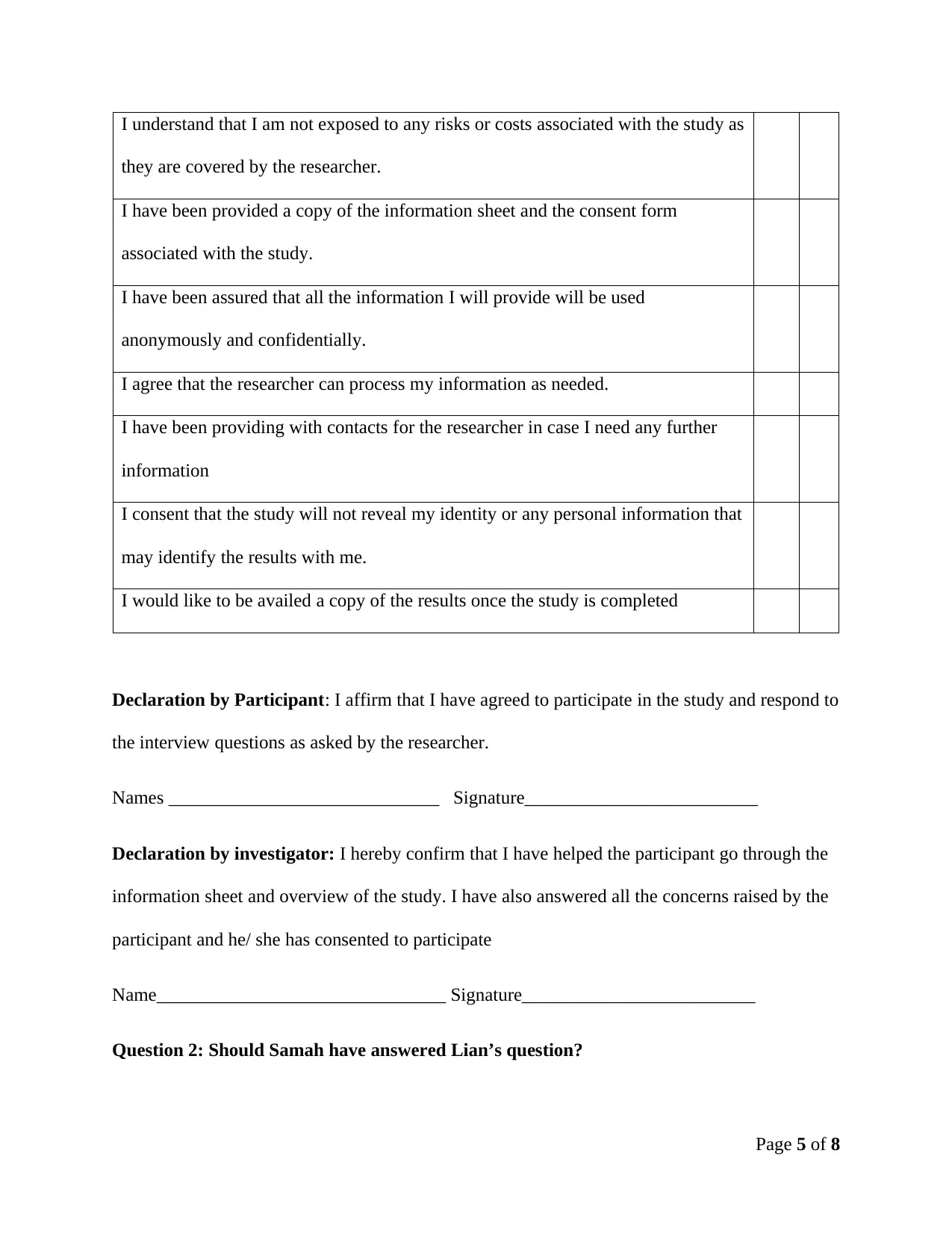
I understand that I am not exposed to any risks or costs associated with the study as
they are covered by the researcher.
I have been provided a copy of the information sheet and the consent form
associated with the study.
I have been assured that all the information I will provide will be used
anonymously and confidentially.
I agree that the researcher can process my information as needed.
I have been providing with contacts for the researcher in case I need any further
information
I consent that the study will not reveal my identity or any personal information that
may identify the results with me.
I would like to be availed a copy of the results once the study is completed
Declaration by Participant: I affirm that I have agreed to participate in the study and respond to
the interview questions as asked by the researcher.
Names _____________________________ Signature_________________________
Declaration by investigator: I hereby confirm that I have helped the participant go through the
information sheet and overview of the study. I have also answered all the concerns raised by the
participant and he/ she has consented to participate
Name_______________________________ Signature_________________________
Question 2: Should Samah have answered Lian’s question?
Page 5 of 8
they are covered by the researcher.
I have been provided a copy of the information sheet and the consent form
associated with the study.
I have been assured that all the information I will provide will be used
anonymously and confidentially.
I agree that the researcher can process my information as needed.
I have been providing with contacts for the researcher in case I need any further
information
I consent that the study will not reveal my identity or any personal information that
may identify the results with me.
I would like to be availed a copy of the results once the study is completed
Declaration by Participant: I affirm that I have agreed to participate in the study and respond to
the interview questions as asked by the researcher.
Names _____________________________ Signature_________________________
Declaration by investigator: I hereby confirm that I have helped the participant go through the
information sheet and overview of the study. I have also answered all the concerns raised by the
participant and he/ she has consented to participate
Name_______________________________ Signature_________________________
Question 2: Should Samah have answered Lian’s question?
Page 5 of 8
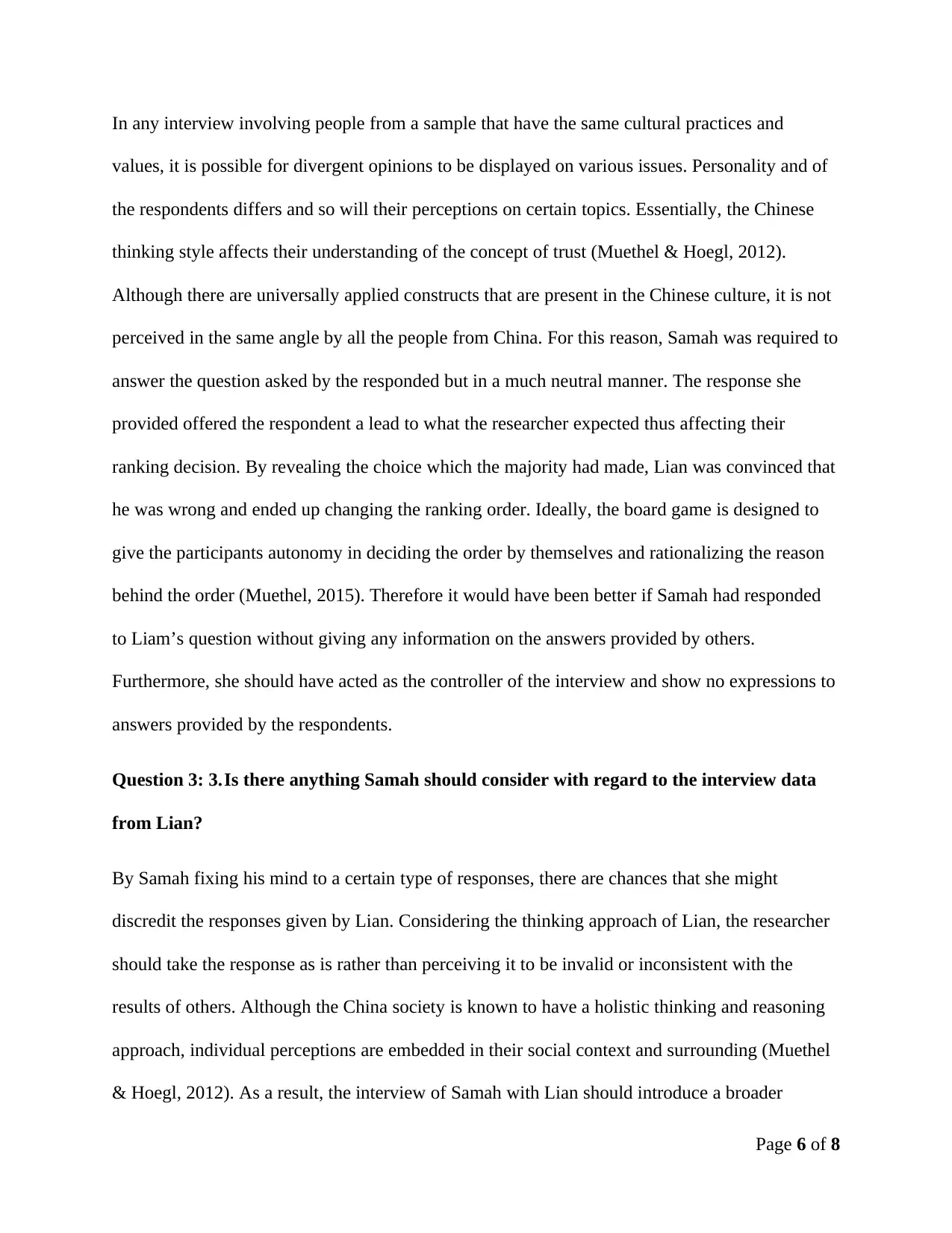
In any interview involving people from a sample that have the same cultural practices and
values, it is possible for divergent opinions to be displayed on various issues. Personality and of
the respondents differs and so will their perceptions on certain topics. Essentially, the Chinese
thinking style affects their understanding of the concept of trust (Muethel & Hoegl, 2012).
Although there are universally applied constructs that are present in the Chinese culture, it is not
perceived in the same angle by all the people from China. For this reason, Samah was required to
answer the question asked by the responded but in a much neutral manner. The response she
provided offered the respondent a lead to what the researcher expected thus affecting their
ranking decision. By revealing the choice which the majority had made, Lian was convinced that
he was wrong and ended up changing the ranking order. Ideally, the board game is designed to
give the participants autonomy in deciding the order by themselves and rationalizing the reason
behind the order (Muethel, 2015). Therefore it would have been better if Samah had responded
to Liam’s question without giving any information on the answers provided by others.
Furthermore, she should have acted as the controller of the interview and show no expressions to
answers provided by the respondents.
Question 3: 3.Is there anything Samah should consider with regard to the interview data
from Lian?
By Samah fixing his mind to a certain type of responses, there are chances that she might
discredit the responses given by Lian. Considering the thinking approach of Lian, the researcher
should take the response as is rather than perceiving it to be invalid or inconsistent with the
results of others. Although the China society is known to have a holistic thinking and reasoning
approach, individual perceptions are embedded in their social context and surrounding (Muethel
& Hoegl, 2012). As a result, the interview of Samah with Lian should introduce a broader
Page 6 of 8
values, it is possible for divergent opinions to be displayed on various issues. Personality and of
the respondents differs and so will their perceptions on certain topics. Essentially, the Chinese
thinking style affects their understanding of the concept of trust (Muethel & Hoegl, 2012).
Although there are universally applied constructs that are present in the Chinese culture, it is not
perceived in the same angle by all the people from China. For this reason, Samah was required to
answer the question asked by the responded but in a much neutral manner. The response she
provided offered the respondent a lead to what the researcher expected thus affecting their
ranking decision. By revealing the choice which the majority had made, Lian was convinced that
he was wrong and ended up changing the ranking order. Ideally, the board game is designed to
give the participants autonomy in deciding the order by themselves and rationalizing the reason
behind the order (Muethel, 2015). Therefore it would have been better if Samah had responded
to Liam’s question without giving any information on the answers provided by others.
Furthermore, she should have acted as the controller of the interview and show no expressions to
answers provided by the respondents.
Question 3: 3.Is there anything Samah should consider with regard to the interview data
from Lian?
By Samah fixing his mind to a certain type of responses, there are chances that she might
discredit the responses given by Lian. Considering the thinking approach of Lian, the researcher
should take the response as is rather than perceiving it to be invalid or inconsistent with the
results of others. Although the China society is known to have a holistic thinking and reasoning
approach, individual perceptions are embedded in their social context and surrounding (Muethel
& Hoegl, 2012). As a result, the interview of Samah with Lian should introduce a broader
Page 6 of 8
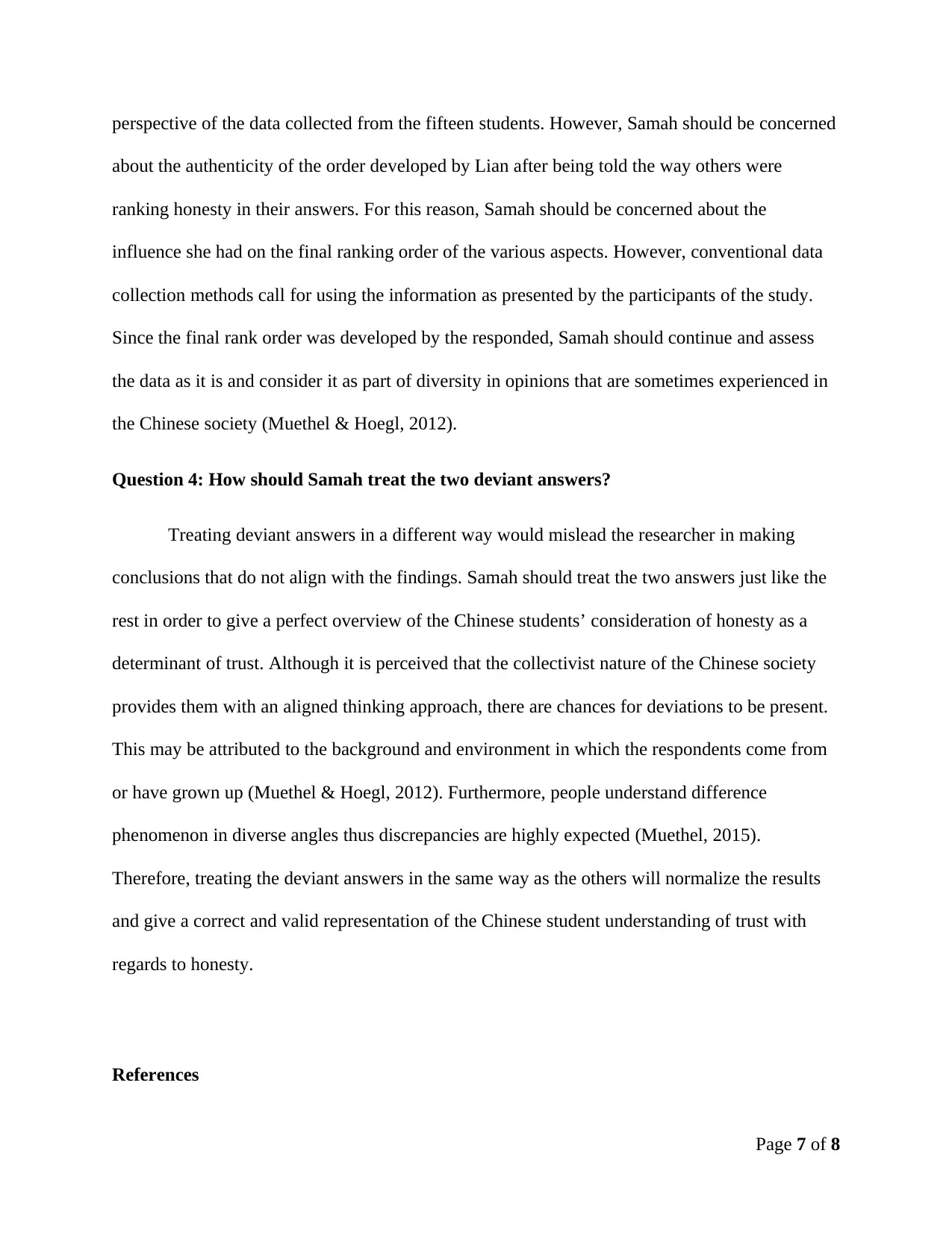
perspective of the data collected from the fifteen students. However, Samah should be concerned
about the authenticity of the order developed by Lian after being told the way others were
ranking honesty in their answers. For this reason, Samah should be concerned about the
influence she had on the final ranking order of the various aspects. However, conventional data
collection methods call for using the information as presented by the participants of the study.
Since the final rank order was developed by the responded, Samah should continue and assess
the data as it is and consider it as part of diversity in opinions that are sometimes experienced in
the Chinese society (Muethel & Hoegl, 2012).
Question 4: How should Samah treat the two deviant answers?
Treating deviant answers in a different way would mislead the researcher in making
conclusions that do not align with the findings. Samah should treat the two answers just like the
rest in order to give a perfect overview of the Chinese students’ consideration of honesty as a
determinant of trust. Although it is perceived that the collectivist nature of the Chinese society
provides them with an aligned thinking approach, there are chances for deviations to be present.
This may be attributed to the background and environment in which the respondents come from
or have grown up (Muethel & Hoegl, 2012). Furthermore, people understand difference
phenomenon in diverse angles thus discrepancies are highly expected (Muethel, 2015).
Therefore, treating the deviant answers in the same way as the others will normalize the results
and give a correct and valid representation of the Chinese student understanding of trust with
regards to honesty.
References
Page 7 of 8
about the authenticity of the order developed by Lian after being told the way others were
ranking honesty in their answers. For this reason, Samah should be concerned about the
influence she had on the final ranking order of the various aspects. However, conventional data
collection methods call for using the information as presented by the participants of the study.
Since the final rank order was developed by the responded, Samah should continue and assess
the data as it is and consider it as part of diversity in opinions that are sometimes experienced in
the Chinese society (Muethel & Hoegl, 2012).
Question 4: How should Samah treat the two deviant answers?
Treating deviant answers in a different way would mislead the researcher in making
conclusions that do not align with the findings. Samah should treat the two answers just like the
rest in order to give a perfect overview of the Chinese students’ consideration of honesty as a
determinant of trust. Although it is perceived that the collectivist nature of the Chinese society
provides them with an aligned thinking approach, there are chances for deviations to be present.
This may be attributed to the background and environment in which the respondents come from
or have grown up (Muethel & Hoegl, 2012). Furthermore, people understand difference
phenomenon in diverse angles thus discrepancies are highly expected (Muethel, 2015).
Therefore, treating the deviant answers in the same way as the others will normalize the results
and give a correct and valid representation of the Chinese student understanding of trust with
regards to honesty.
References
Page 7 of 8
Paraphrase This Document
Need a fresh take? Get an instant paraphrase of this document with our AI Paraphraser
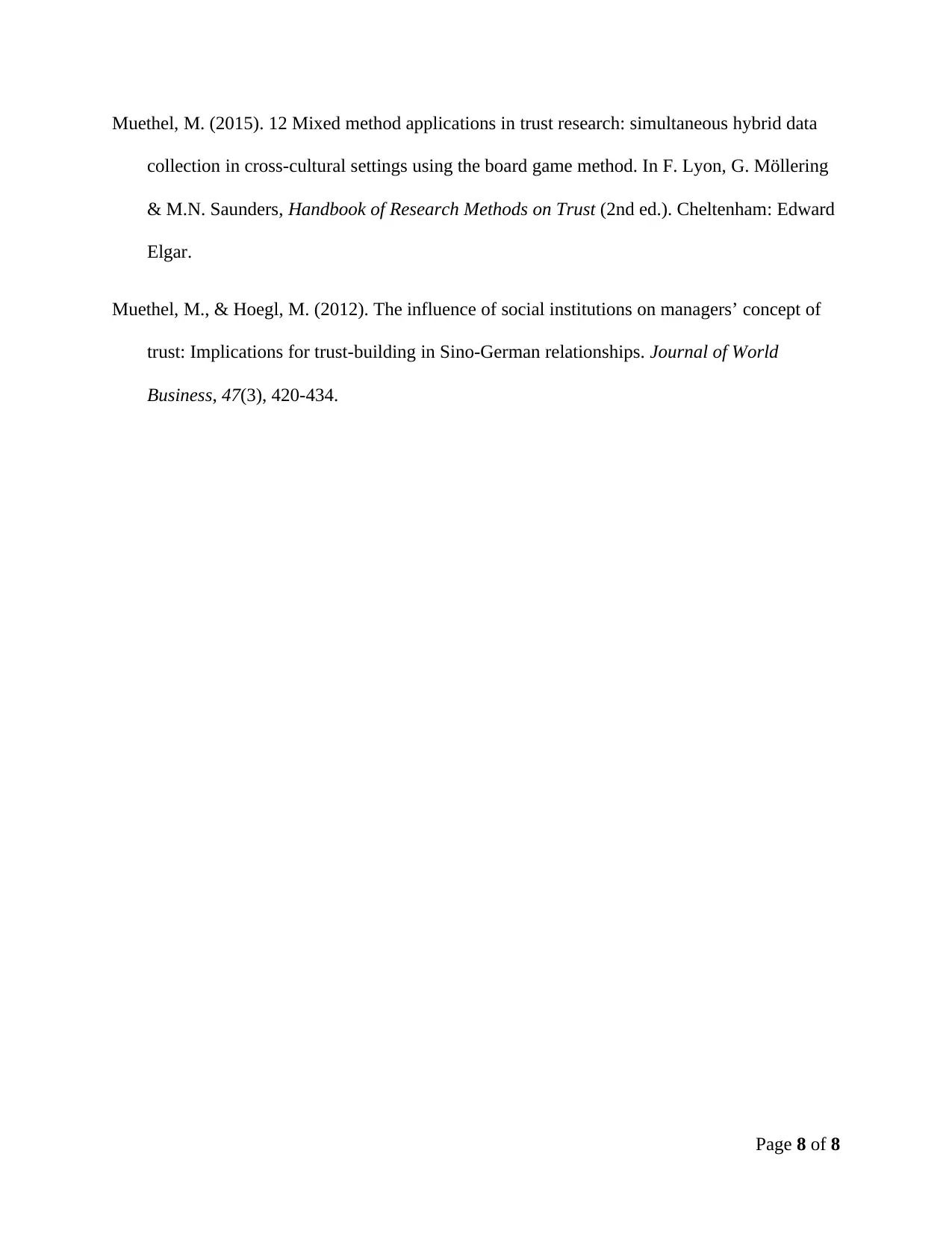
Muethel, M. (2015). 12 Mixed method applications in trust research: simultaneous hybrid data
collection in cross-cultural settings using the board game method. In F. Lyon, G. Möllering
& M.N. Saunders, Handbook of Research Methods on Trust (2nd ed.). Cheltenham: Edward
Elgar.
Muethel, M., & Hoegl, M. (2012). The influence of social institutions on managers’ concept of
trust: Implications for trust-building in Sino-German relationships. Journal of World
Business, 47(3), 420-434.
Page 8 of 8
collection in cross-cultural settings using the board game method. In F. Lyon, G. Möllering
& M.N. Saunders, Handbook of Research Methods on Trust (2nd ed.). Cheltenham: Edward
Elgar.
Muethel, M., & Hoegl, M. (2012). The influence of social institutions on managers’ concept of
trust: Implications for trust-building in Sino-German relationships. Journal of World
Business, 47(3), 420-434.
Page 8 of 8
1 out of 8
Related Documents
Your All-in-One AI-Powered Toolkit for Academic Success.
+13062052269
info@desklib.com
Available 24*7 on WhatsApp / Email
![[object Object]](/_next/static/media/star-bottom.7253800d.svg)
Unlock your academic potential
© 2024 | Zucol Services PVT LTD | All rights reserved.




